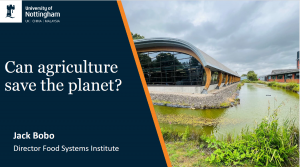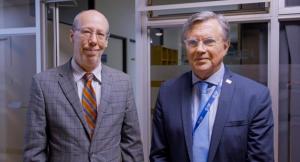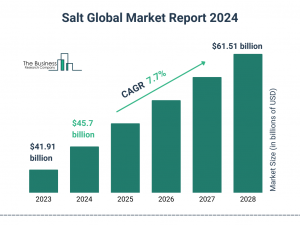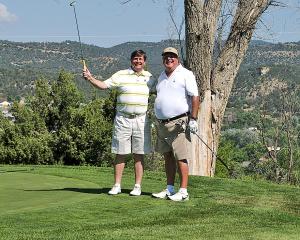
Can agriculture save the planet?

Manuel Otero and Jack Bobo
Manuel Otero and Jack Bobo lead discussion with Inter-American Institute for Cooperation on Agriculture
— Jack Bobo
SAN JOSé, COSTA RICA, October 25, 2024 /EINPresswire.com/ — (IICA) – Opinion leaders from across the continent conversed with Professor Jack Bobo, globally renowned for his innovative work in science communication, about the transformations taking place in agriculture and the most effective ways to communicate the importance of the sector for food security and environmental sustainability, as well as the role of innovation.
Alongside Manuel Otero, Director General of the Inter-American Institute for Cooperation on Agriculture (IICA), Bobo, who is the Director of the Food Systems Institute at the University of Nottingham in the United Kingdom, engaged in discussions with IICA’s Advisory Committee on Communication for Agriculture and Food Security.
This committee is composed of journalists covering the agricultural sector and experts in public and institutional communication.
The role of technology in agri-food systems, the importance of journalism in communicating scientific advancements, upcoming transformations, consumer preferences and their food choices, the gap between rural and urban populations, and the need for dialogue to understand their respective needs were some of the key topics discussed.
“Journalists play a fundamental role because they are responsible for translating the challenges of agriculture, an activity with significant environmental impact but also critical for human survival, into language that the public can easily understand,” said Bobo, whose work in science communication earned him the Borlaug CAST Communication Award from the World Food Prize Foundation earlier this year.
Bobo, who worked for 13 years with the U.S. government and the Department of State on global food policy, highlighted that agriculture is often portrayed negatively: it uses 40% of the land and 70% of the planet’s water, and directly or indirectly generates 25% of greenhouse gas emissions, all while 800 million people go hungry.
“The question many people ask is whether our agri-food systems are failing. To answer that, we need to understand where we’ve come from. Sixty years ago, 30% of the global population went to bed hungry, and today that figure is 10%. While that percentage is still unacceptable and we can do better, the direction we’re moving in is positive,” he explained.
“The public needs to know that when it comes to agriculture, things aren’t getting worse, they’re getting better. Although progress isn’t fast enough, the challenge is not to change direction but to accelerate the transformations,” he added.
The IICA Communication Committee was launched in 2020 with the aim of positively influencing public recognition of agricultural value chains. Initially composed of ten members from seven countries, it has since expanded to include representatives from the private sector and now has over 20 members representing a variety of countries and communication roles.
On this topic, IICA Director General Manuel Otero explained that agriculture is often perceived as disconnected from national economies, focused on primary products, and with questionable environmental conservation credentials.
“We need to move beyond those outdated labels. IICA is committed to constructing a narrative that reflects a deeply interconnected agriculture—linked to environmental, energy, and nutritional issues. It’s about shifting from a defensive to an offensive stance,” said Otero.
This was the third meeting of the Communication Committee in 2024.
Committee members include Héctor Huego (Editor of Rural, Clarín, Argentina), Cristian Mira (Editor of the agricultural section, La Nación, Argentina), Julio Cargnino (President of Canal Rural, Brazil), Mauro Zafalon (specialist columnist at Folha de S.Paulo, Brazil), Patricia Vildósola (Editor of the agricultural section, El Mercurio, Chile), Juan Carlos Domínguez (columnist at El Tiempo, Colombia, and institutional communication specialist), Juan Samuelle (Editor of El Observador, Uruguay), Cecilia Martiren (Institutional Relations and CSR Manager, Biogénesis Bagó, Argentina), Claudia Palacios (Anchor and Editor at CM& Canal 1, Colombia), Douglas Marín (correspondent for EFE, Costa Rica), Ederson Granetto (Head of Agro+ TV, Brazil), Gabino Rebagliatti (Director of Community Affairs, Bioceres, Argentina), Gabriel Estrela (journalist at Agro+ TV, Brazil), Gustavo Ripoll (Corporate Communications Manager, Grupo Insud, Argentina), Hugo Castellano (communication consultant, Mexico), Julian Rogers (communication consultant, Caribbean region), Laura Cristóbal (Director General of EFE Agro, Spain), Mauricio Bártoli (Director of TN Campo/Clarín, Argentina), Mónica Velázquez (Communications Director at CropLife Latin America, Colombia), Silvia Naishtat (Editor at Clarín, Argentina), Teresa Montoro (Director and presenter, Hora América, RTVE, Spain), Navendra Soaj (Editor-in-Chief of the Guyana Chronicle), and Daniela Blanco (Editor at Infobae, Argentina).
Looking towards 2050
Bobo, one of the leading experts on future agricultural trends, explained that by 2050, population growth will slow dramatically, and towards the end of the century, it will begin to reverse.
“This gives us an opportunity. We need to make it to 2050 without having destroyed our forests or dried up our rivers. If we can make it to 2050 without causing irreparable damage, the situation will ease with population decline. That’s why I say the next 25 years will be the most important in agriculture’s 10,000-year history,” said Bobo.
The expert also criticized certain accepted consensus, such as estimates of countries’ greenhouse gas emissions. “It is often said that some countries, which don’t produce food, don’t emit gases, but this statement is misleading. In international food trade, the emissions from production should be counted by those importing the food, not just those producing it,” he argued.
About IICA
IICA is the specialized agency for agriculture in the Inter-American system, with a mission to encourage, promote and support its 34 Member States in their efforts to achieve agricultural development and rural well-being through international technical cooperation of excellence.
More information:
Institutional Communication Division.
[email protected]
Press release online: https://iica.int/en/press/news/regional-opinion-leaders-engage-discussions-jack-bobo-recognized-leading-expert-science
Randall Cordero
Inter-American Institute for Cooperation on Agriculture
+506 2216 0222
email us here
Visit us on social media:
Facebook
X
LinkedIn
Instagram
YouTube
Legal Disclaimer:
EIN Presswire provides this news content “as is” without warranty of any kind. We do not accept any responsibility or liability
for the accuracy, content, images, videos, licenses, completeness, legality, or reliability of the information contained in this
article. If you have any complaints or copyright issues related to this article, kindly contact the author above.
![]()
Article originally published on www.einpresswire.com as Regional opinion leaders engage on ways to explain irreplaceable role of agriculture and importance of innovation




